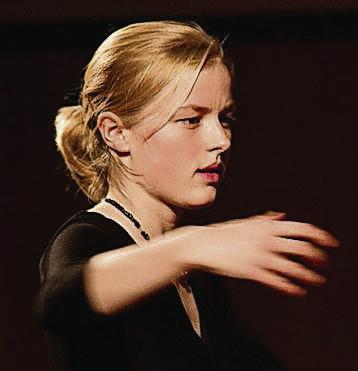Mendelssohn and electronics don’t mix at DSO’s “Remix”

Ruth Reinhardt conducted the Dallas Symphony Orchestra Friday night at Dallas City Performance Hall.
The Dallas Symphony Orchestra’s annual Soluna International Music & Arts Festival inevitably includes some misses as well as some hits. Friday evening’s performance of Felix Mendelssohn’s complete incidental music to A Midsummer Night’s Dream featured some moments of loveliness, for the most part it was one of the misses.
The Soluna Festival includes not only conventional and often ambitious orchestral and chamber music performances, but also more experimental programs in a variety of settings. This concert was part of the Dallas Symphony’s Remix concert series, which is conceived as being a more casual style of symphony concert; performances take place in the smaller Dallas City Performance Hall, tickets are comparatively inexpensive, and there are snacks, free drinks and other perks. The goal is evidently to attract a younger audience of newcomers for classical music.
The downside of these concerts is that in an effort to appeal to under-40s, sometimes the whole thing can go off the rails.
The first sign of trouble emerged in the Scherzo that Mendelssohn wrote to accompany Act I of Shakespeare’s play. This famously difficult music is a standard audition piece for string players–exposed and with no margin for error. An ideal performance will be delicate and precisely coordinated.
That did not happen. The orchestra, under assistant conductor Ruth Reinhardt, did not sound like itself. Strings were untidy and winds had some surprising intonation problems. Mercifully, they settled in within a few minutes, with much improved results. The music for Act II and following was mostly clean and well-balanced.
Reinhardt kept tempos moving—the Wedding March, which can seem inappropriately lugubrious, zipped along at a cheerful clip. The parodic Funeral March and the Bergomask dance, or Dance of Clowns, were suitably lighthearted, with fine solos by bassoonist Theodore Soluri and clarinetist Gregory Raden.
Vocalists were generally excellent: the Women’s Voices of the Dallas Symphony Chorus proved exemplary and well-prepared by assistant chorus director Lindsay Pope. Soprano soloists Kelly Silverthorn and, especially, Alissa Roca shimmered and glowed, although their placement among the chorus, on risers at the back of the stage, hampered projection.
The extramusical elements were less successful. Lighting, by Suzanne Lavender, was certainly pretty—washes of changing color, sometimes streaked with white, added visual interest to the stage. However, the dimmer-than-usual lighting also made instrumentalists, chorus, soloists, and actors blend together into a sea of black—the small colorful accents that musicians are encouraged to wear for the Remix concerts didn’t help much.
Southern Methodist University’s electronic music trio Uda Essim Triangle, performing unseen from the balcony, provided brief interludes between movements of Mendelssohn’s music. These fifteen- or twenty-second snippets ranged from delicate to something that resembled plumbing noises. Perhaps self-evidently, electronic music seemed out of place with the Mendelssohn, although hearing–and seeing–this ensemble in another context would be welcome.
Three actors read lines from Shakespeare’s A Midsummer Night’s Dream both in between and over the top of Mendelssohn’s incidental music. Incorporating Shakespeare’s language into a performance of the music Mendelssohn wrote to accompany it is a delightful idea. However, only listeners already familiar with Shakespeare’s play could have made sense of the disjointed bits of text. Actors Blake Hackler, portraying Puck and Bottom, and Christine Sanders, playing Titania and Hermia, managed to get their inflections mostly right, so that they even got a few scattered laughs. Sanders’ repeated changes of scarf—what did each scarf represent?—were puzzling and a distraction. Ryan Woods, as Oberon and Theseus, needs some additional coaching in reading Shakespeare’s iambic pentameter, with the objective of making this poetry sound more like conversation.
Ultimately, this was a program that proved better in concept than in execution.
This program will be repeated 7:30 p.m. Saturday. mydso.com